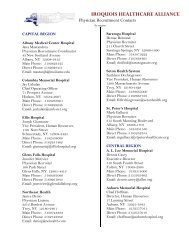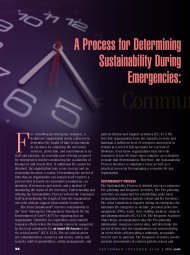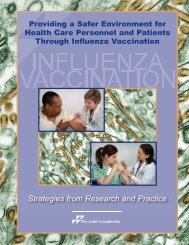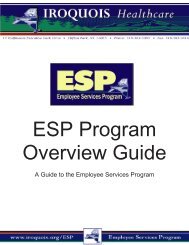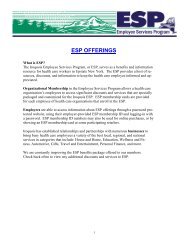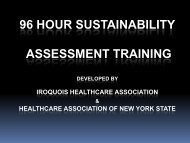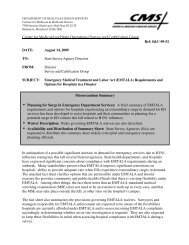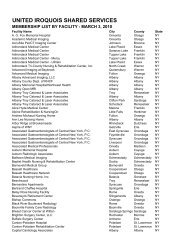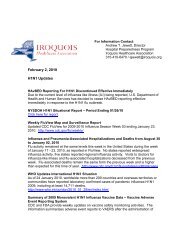NYS Public Health Legal Manual: A Guide for Judges, Attorneys ...
NYS Public Health Legal Manual: A Guide for Judges, Attorneys ...
NYS Public Health Legal Manual: A Guide for Judges, Attorneys ...
You also want an ePaper? Increase the reach of your titles
YUMPU automatically turns print PDFs into web optimized ePapers that Google loves.
§ 1.60 NEW YORK STATE PUBLIC HEALTH LEGAL MANUAL<br />
the degree to which it intrudes upon an individual’s privacy, and, on the<br />
other, the degree to which it is needed <strong>for</strong> the promotion of legitimate<br />
governmental interests.” United States v. Knights, 534 U.S. 112, 118-19<br />
(2001), quoting from Wyoming v. Houghton, 526 U.S. 295, 300 (1999).<br />
While in the criminal context this balancing test usually requires the<br />
obtaining of a warrant based on a showing of probable cause (except in<br />
certain situations permitting searches made incidental to lawful arrests),<br />
the obtaining of warrants and a showing of probable cause are not indispensable<br />
components of reasonableness in every circumstance. MacWade<br />
v. Kelly, 460 F.3d 260, 268 (2d Cir. 2006). A standard of “reasonable suspicion,”<br />
without the obtaining of a warrant, may be permitted “when a<br />
balance of the governmental and private interest makes such a standard<br />
reasonable.” United States v. Knights, supra, 534 U.S. at 121. Where a<br />
search is not directed at uncovering evidence of a crime, the use of a “reasonable<br />
suspicion” test may satisfy that balance. See Patchogue-Med<strong>for</strong>d<br />
Congress of Teachers v. Board of Education, supra, 70 N.Y.2d at 68-69<br />
[urine test]; Nicholas v. Goord, supra, 430 F.3d at 660 [DNA test]. Cf.<br />
City of Indianapolis v. Edmond, 531 U.S. 32, 37 (2000) [roadblock search<br />
held unreasonable in absence of “individual suspicion of wrongdoing”];<br />
Tenenbaum v. Williams, 193 F.3d 581, 599 (2d Cir. 1999) [holding stricter<br />
constitutional standard required to undertake “investigative examination”<br />
of child rather than “one that is ‘medically indicated’ and designed <strong>for</strong><br />
treatment”].<br />
There is, however, a “special needs” exception to the reasonable<br />
suspicion standard. Courts have upheld searches, in a non-criminal<br />
context, that are not based on any suspicion, but that are applied to<br />
everyone, or to those randomly selected, in an ef<strong>for</strong>t to achieve a greater<br />
public need. In doing so, courts have balanced (1) the weight and<br />
immediacy of the government interest, (2) the nature of the privacy<br />
interest compromised by the search, (3) the character of the intrusion<br />
imposed by the search, and (4) the efficacy of the search in advancing the<br />
government interest. MacWade v. Kelly, supra, 460 F.3d at 269 [applying<br />
special needs exception in upholding random package searches on<br />
subway plat<strong>for</strong>ms]. The courts have applied this “special needs”<br />
exception to non-criminal searches of the body. See Nicholas v. Goord,<br />
supra, 430 F.3d 652 [upholding DNA tests <strong>for</strong> all convicted felons]. See<br />
also Patchogue-Med<strong>for</strong>d Congress of Teachers v. Board of Education,<br />
30



